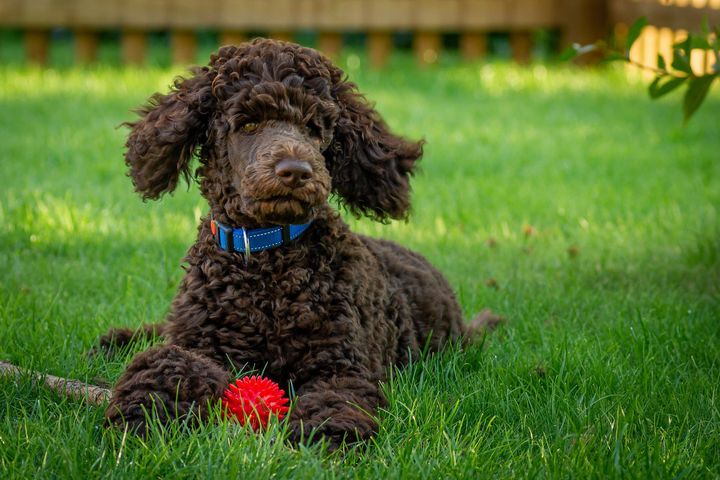Lab VS Golden Retriever: PROs and CONs - Which is the Best?

Curious to know if these lovable dogs are related? Among the most popular dog breeds in the United States, Retrievers are extremely similar. They are both highly intelligent, energetic with amazing personalities and a huge love for any human and animal.
But how can you choose between a Golden and a Labrador Retriever? They are both goofy, friendly, obedient, and affectionate. Plus, both doggos are good-looking dog breeds.
This article will provide you all the information you need about these two popular breeds. It will be easier to make an informed conclusion about your future family dog.
So, even if you want to get one of these two loving dog breeds, or you're just curious to know more infos about the differences, traits, temperament, and aptitudes of the Labrador and the Golden Retriever, continue reading this article!
Table of contents:
- Are Labs and Golden Retrievers the same?
- Which is calmer Labrador or Golden Retriever?
- Which sheds more hair: Labrador or Golden Retriever?
- Origin
- Appearance
- Personality and Temperament
- Activity level
- Traits
- Grooming
- Health issues
- Lifespan
- Puppies
Golden Retriever vs Labrador facts
Difference between Golden and Labrador Retriever
Golden Retriever vs Labrador facts
Are Labs and Golden Retrievers the same?
❌ The answer is NO, the Golden Retriever and the Labrador are not the same breed. The two dog breeds are Retrievers, which were bred for hunting and swimming purposes.
✅ Also, both Retrievers have a common ancestor: the St. John's Water Dog, also known as lesser Newfoundland.
St. John's Water Dogs were developed to assist fishermen in dragging their catches across the ice. These retrieving characteristics were handed down to the breeds' contemporary relatives, making Goldens and Labs excellent swimmers.
👉 Because they are not the same, the first thing that distinguishes them is their coat: Golden's coat is hairier than a Lab's, which is shorter.

⩬ Now, let's have a quick look at their similarities:
- excellent athletes
- outdoor companions
- active breeds (best exercise buddies)
- great and loving family members
- kind and loving nature
- high intelligence: both are trained easily
- candidates for service dog registration
- appearance: color, size, looking
- same life span: 10 – 12 years
Which is calmer Labrador or Golden Retriever?
Goldens are generally thought to be more gentle, kind, patient, and delicate than Labs. While both do well in families with children, Labs have an advantage when it comes to adapting to homes with noisy, active, and loud small children. Many Goldens prefer a slightly calmer and more quiet living environment.
*Both are high-energy dogs that need the same amount of training and activities to burn off some energy. Labs, on the other hand, are a little more hyperactive than Golden Retrievers.
Which sheds more hair: Labrador or Golden Retriever?
Both Labradors and Golden Retrievers are known to shed a lot, thus they must be groomed on a regular basis. As both breeds have double coats, they have two large sheds every year. While Labs' hair is shorter and does not need to be trimmed on a regular basis, their double coat will still require routine maintenance.
Difference between Golden and Labrador Retriever: PROs & CONs
| Aspect | Labrador Retriever | Golden Retriever |
|---|---|---|
| Temperament | PRO: Active, friendly, and outgoing. CON: Can be stubborn and hyperactive without enough exercise and training. | PRO: Friendly, obedient, and patient. CON: Can be overly eager to please and sensitive to harsh training methods. |
| Energy Level | PRO: Very high energy levels and require a lot of exercise. CON: May become destructive if not given enough physical activity. | PRO: High energy levels but typically more mellow and relaxed than Labradors. CON: Still require daily exercise to stay healthy and happy. |
| Grooming | PRO: Short coat that is easy to maintain and requires minimal grooming. CON: Can still shed quite a bit, especially during seasonal changes. | PRO: Long, silky coat that is beautiful and requires regular grooming. CON: Can be quite time-consuming and may require professional grooming. |
| Trainability | PRO: Very intelligent and eager to please, making them easy to train. CON: Can be easily distracted and may need additional focus and patience. | PRO: Eager to learn and obedient, making them easy to train. CON: May be overly sensitive to harsh training methods and require gentle, positive reinforcement. |
| Health | PRO: Generally healthy breed with few hereditary health problems. CON: Can be prone to hip and elbow dysplasia. | PRO: Generally healthy breed with few hereditary health problems. CON: Can be prone to hip dysplasia and certain types of cancer. |
| Size | PRO: Medium-sized breed that is easy to manage in smaller living spaces. CON: Can be quite heavy and strong, making them difficult to handle for some people. | PRO: Large-sized breed that is great for families with larger living spaces. CON: May be difficult to manage for some people due to their size and strength. |
Golden vs Labrador Retriever
1. Origin
🐾 Golden Retrievers: Scottish Highlands (in the late 1800s)
Golden Retrievers are from the Scottish Highlands, where they were predominantly bred as hunting dogs. They were intended to be bird dogs, specifically for hunting waterfowl.
The breed was created by crossing a variety of different breeds, including Spaniels, Setters, the Newfoundland (not the Newfoundland we know today).
🐾 Labrador Retrievers: the Canadian province of Newfoundland (the 1500s)
In the early 1900s, hunters and farmers from the United States learned of the breed’s work ethic and began incorporating “Labs” into their daily lives.
2. Appearance
🟡 Coat and tail
#Goldens have a famous double coat. The outer coat of a Golden Retriever is dense and water-repellent, with a thick undercoat. Some coats can be long and wavy, while others are straight. The fur on the rear of the front legs and underbody is ruffled, with stronger feathering on the chest, back of the thighs, and tail.

#Labrador's coat is smooth and easy to care for, with two layers: a short, thick, straight outer coat and a soft, weather-resistant undercoat. The two-layer coat protects them from the cold and wet, which assists them in their function as hunters' retrievers.

🎨 Colors
#Golden Retrievers come in a variety of gold colors, ranging from light to dark. The coat can be any color of cream, yellow, or gold and it normally becomes whiter with age.

Actually, there are 5 famous varieties of colors for a Golden, but only 3 of them are officially recognized as a “standard color” by the AKC:
- cream
- light golden - recognized by AKC
- golden - recognized by AKC
- dark golden - recognized by AKC
- red
#Labradors only come in three different colors, plus one that is very rare:
- yellow
- chocolate
- black
- red (rare)
Initially, breeders preferred black Labs, although yellow and chocolate Labs have since gained popularity. Some breeders have recently started to sell "unique" Labrador Retriever colors such as polar white and fox red. These colors aren't particularly uncommon; they're a variant on the yellow Labrador.



📐 Size
#Golden Retriever:
Male:
Height: 23 - 24 inches
Weight: 65 - 75 pounds
Female:
Height: 21.5 - 22.5 inches
Weight: 55 - 65 pounds
#Labrador Retriever
Male:
Height: 22.5 - 24.5 inches
Weight: 65 - 80 pounds
Female:
Height: 21.5 - 23.5 inches
Weight: 55 - 70 pounds
3. Personality and Temperament
#Golden Retriever is a calm, smart, loyal, and lovable dog. Golden Retrievers are active but friendly with children and get along very well with other pets and strangers.
Golden Retrievers are often friendly, playful, and gentle. Goldens such unique souls because they are the ideal family dog. His affectionate and outgoing nature, and always eager-to-please friend make them great for playing with youngsters in the backyard while they are youthful.
The Golden Retriever not only adores children but also enjoys the bustle they bring. They'll gladly attend a child's birthday celebration and even put on a party hat. That means the Golden Retriever's patience is at a high level. But, like any other dogs, they must be taught how to behave with children, and children must be taught how to behave around the dog.
#Labrador Retrievers are kind, intelligent, energetic, and devoted. Above all else, having Labs around is real fun! They enjoy nothing more than playing in the yard, swimming, exploring, and meeting new people and animals.
Labs, like Goldens, enjoy being around children and may be taught to play gently with small kids. I said they "can learn to play" not because they are aggressive, but because they are overly excited. Labrador retrievers have a higher amount of energy and must be educated to be gentle around toddlers.
These smart pups desire to please their owners. As a result, they're very trainable. Also, Labs are obedient to their owners and will follow your lead.
4. Activity Level



Both Retrievers are highly active, but Labs are killing it.
Labs and Goldens are part of the sports dog breed. They were created to spend the entire day with their human mates, swimming, running, and, of course, retrieving games. As a result, they are made for an active lifestyle. If you're an active person who enjoys running, walking, and exploring, these are the right breeds for you.
5. Traits
#Golden Retriever:
- Straight or wavy long coat
- Water-repellent coat
- Comes in many many varieties of Gold (from light to dark)
- Athletic construction
- Long snout
- Happy facial expression and mood
- Extremely loving
- High energy, but very patient and calm
- Smart and easy to train
- Great service dogs and family members
- Gentle with kids
- Very patient
- Extremely friendly with humans and other animals
- Loves water
- Quiet breed: rarely barks
#Labrador Retriever:
- Short straight coat
- Water-repellent coat
- 3 colors: black, yellow, chocolate
- Muscular construction
- A wide head with prominent brows
- Enthusiastic
- Highly trainable
- Extremely loving
- High energy, but very patient and calm
- Great service dogs and family members
- Loves children
- Very active: loving adventures and sport activities, especially water
- Friendly and hyperenergetic
- Easy to groom
6. Grooming
Both Goldens and Labs are known as famous shedders, thus they must be groomed on a regular basis. Both breeds have double coats and have two large sheds every year.
While Labrador's hair is shorter and doesn't need to be trimmed on a regular basis, their double coat will still require to be groomed from time to time.
Because Goldens have long, fabulous coats, you'll need to use an undercoat brush on a regular basis to keep the hair from matting. They'll also require regular trimming around extra fluffy parts like the ears, tail, and neck.
7. Health
Health issues that both Retrievers have in common:
- High cancer risk 😢
- Hip dysplasia
- Ear infections
- Obesity
#Golden Retrievers are prone to:
- cancer (60% of Goldens die from cancer)
- mast cell tumors
- elbow dysplasia
- hypothyroidism
- sub-aortic stenosis (SAS)
- eye disorders
- ear infections
- seizures
- obesity
#Labrador Retrievers are prone to:
- obesity
- hip dysplasia
- ear infections
- eye diseases
- epilepsy, seizures
- heart disease
- allergies (environmental allergies)
- bloat
- tumors
8. Lifespan
- Golden retrievers: 10 - 12 to 13 years
- Labrador retrievers: 10 - 12 years
9. Puppies

Golden Puppies are the cuteness itself! Although Golden Retriever pups are sociable, they still require a lot of socialization and training to educate them for well-mannered adult years.

Lab puppies are definitely lively sweet balls! If you're parenting a Lab puppy, you'll need to take extra precautions. Prevent your Lab puppy to run and play on really hard surfaces like asphalt (like in this video) until it is at least two years old and its joints have fully matured.
I hope that now you have a better overview of the difference between a Lab and a Golden Retriever.
Both of them are such great souls to have as companions, but be sure you are aware of both pros and cons of these two breeds. Goldens and Labradors need much love, care, and daily exercise. If you are more of a snuggle person who enjoys spending time at home watching movies, cooking, and occasionally going out for sports, then a small and most popular dog breeds in the United States, lazy breed may be suitable for you!
Paws and love until the next article! 🐾
Frequently Asked Questions
Do Golden Retrievers have hair or fur?
As the name suggests, Golden Retrievers have golden or yellow fur that comes in a variety of colors. They also have a tough, water-repellent outer coat, which can be wavy or straight.
Which is more affectionate: Goldens or Labs?
Both Retrievers are affectionate, friendly, and loyal dogs. They both have wonderful temperaments, but a Golden Retriever is more gentle, sensitive, and patient than Labrador. Labradors show their love in an energetic way: playing, licking, leaning, or sitting on you.
Do Labs or Goldens bark more?
While both dogs breeds bark rarely, the Labrador Retriever barks slightly a bit more than the Goldens. However, with the appropriate training and cues, the barking issues can be reduced and even eliminated.




Comments ()